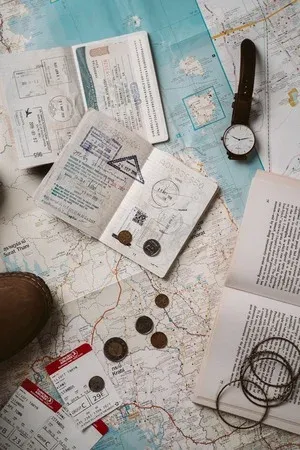Here are some of the most common money mistakes to avoid when traveling abroad.
Frequent travelers know how tricky money can be when traveling abroad.
Should you carry a huge wad of cash or charge all purchases to your credit
card? Wrong decisions can make you spend more than you intended.

|
| Photo by Taryn Elliott |
7 Common Money Mistakes to Avoid When Traveling Abroad
Lifestyle vlogger Jennie Ver Gabon, a wanderer at heart who currently works in
Japan, shares some tips to avoid costly money mistakes when traveling.
1. Exchanging money at the airport
Airport exchange kiosks aren’t the best place to get local currency as they
often have less favorable exchange rates and higher conversion fees. Instead,
exchange your money before you leave home, so you have enough time to shop
around for the best rate. You can call your bank to know if they offer foreign
currency exchange services.
2. Failing to plan ahead for your local transport
Not researching the airport’s distance to your hotel and your transportation
options can slash a huge chunk off your budget. You might end up taking taxis,
which are notorious for overcharging tourists. Look up how the train or bus
system works in your travel destination. Your hotel may also provide airport
shuttle services, so remember to call ahead.
3. Traveling without insurance
Lost luggage, accident claims, and flight cancellations are usually problems
that can be remedied by travel insurance. These emergencies are a headache to
deal with and can set you back thousands of bucks.
It’s better to invest in a comprehensive travel insurance for your peace of
mind, especially if you’re a frequent flyer. Getting a travel insurance that
covers expenses for medical emergencies is also highly recommended in this age
of COVID-19.
4. Using your debit or credit card
We all love our debit and credit cards for their convenience, but you have to
think twice about swiping when abroad. Depending on your bank and card, you
might be charged a foreign transaction fee of up to 3.5% for every purchase.
Probably not what you want to spend your travel budget on, right? So, check
your card issuer’s policies on offshore transactions before you leave.
5. Withdrawing from local ATMs
Withdrawing local currency from the ATMs in your destination could be a good
way to score decent exchange rates. Still, you have to be careful with service
charges and withdrawal limits. Call up your local bank before your trip to
inquire about international transaction fees and daily withdrawal limits so
you can plan accordingly.
6. Keeping all your cash in one place
Be careful with how much cash you carry and where you keep them when you’re in
another country. Tourists often fall prey to pickpockets and thieves because
of neglect. You don’t want a robber to ruin your vacation, right?
7. Exchanging leftover cash back to peso
If you still have some foreign currency left on your last day, you’re better
off spending it in duty-free shops instead of exchanging it back to peso. The
exchange rate to peso will probably be lower than the rate to the currency you
need. This means you’ll make the most of your money if you just spend it —
unless you have immediate plans to return to the same travel destination.
Say ‘Hello’ to Worry-Free Trips Abroad
Besides these seven common money mistakes, the best trick Ms. Gabon has
learned from all her travels is to use digital payments like e-wallets.
One of the e-wallets that support overseas payments is HelloMoney, which is
powered by Asia United Bank (AUB), one of the fastest-growing publicly listed
universal banks in the Philippines. Last November, AUB, in collaboration with
Alipay+ of the Ant Group, made the e-wallet available and accepted for use
initially in South Korea and Japan. This means traveling in these foreign
cities is now more convenient by saving you the hassle of exchanging your
money or carrying cash.
You can use the HelloMoney app in convenience stores, restaurants, and retail
shops, as long as the merchant accepts Alipay+. You can even pay for your
transportation expenses using HelloMoney since train systems in Japan and
South Korea, as well as some taxi drivers, are now Alipay+ partners.
HelloMoney is easy to use. All you have to do is scan the QR code at the
cashier and you’re done! Some merchants require you to generate a QR code,
which the cashier will scan with a barcode reader. Either way, the transaction
won’t take more than two minutes.
Other than digital payments, the e-wallet also lets you buy prepaid load,
remit money through PeraPadala, settle bills, and withdraw from an ATM.
AUB is also expanding HelloMoney’s market in other Asian countries so you’ll
be able to use it in other countries soon, too! For now, enjoy your HelloMoney
to go cashless in the lands of the rising sun and the morning calm.
This post may contain affiliate links, including those from Amazon Associates, which means that if you book or purchase anything through one of those links, we may earn a small commission but at no extra cost to you. All opinions are ours and we only promote products that we use.
Download a free copy of my Churches of Nueva Ecija eBook HERE!
Post a Comment